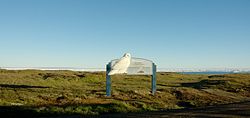The Birnirk site (Iñupiaq: Piġniq) is an archaeological site near Utqiagvik, Alaska. It includes sixteen prehistoric mounds which have yielded evidence of very early Birnirk and Thule culture. It is the type site of the Birnirk culture, and was designated a National Historic Landmark in 1962 for its archaeological importance in understanding prehistoric Arctic cultures.[3]
Birnirk site | |
Alaska Heritage Resources Survey
| |
 Mounds at the site | |
| Location | Address restricted[2] |
|---|---|
| Nearest city | Utqiagvik, Alaska |
| NRHP reference No. | 66000953[1] |
| AHRS No. | BAR-001 |
| Significant dates | |
| Added to NRHP | October 15, 1966[1] |
| Designated NHL | December 29, 1962[3] |
Description
editBirnirk is located on the Alaska North Slope, near the settlement of Utqiagvik, on land owned by the Ukpeaġvik Iñupiat Corporation since 1988. The site consists of sixteen mounds, which represent dwelling sites across a fairly wide span of time. Major scientific excavations were made at this site in 1936, and in 1951-53, when three mounds were excavated, and in 1959, when seven mounds were partially excavated. The major period of occupation at this site was during what is now designated the Birnirk culture, between 500 and 900 CE. Evidence was also found at one mound of occupation during the later Thule culture, which was generally active 1100-1400 CE. Finds at the site include harpoon heads made of antler and stone, including at least one from the older Punuk culture.[4] Also uncovered were fragments of wood making up elements of traditional seal-hunting umiaks.[5]
The site was declared a National Historic Landmark in 1962, and was listed on the National Register of Historic Places in 1966.[3][1] The major collections of materials from the site made in the 1950s were located at Harvard University's Peabody Museum of Archaeology and Ethnology for many years, but were moved to the University of Alaska Museum of the North in Fairbanks in 2011.[5]
See also
editReferences
edit- ^ a b c "National Register Information System". National Register of Historic Places. National Park Service. January 23, 2007.
- ^ Federal and state laws and practices restrict general public access to information regarding the specific location of this resource. In some cases, this is to protect archeological sites from vandalism, while in other cases it is restricted at the request of the owner. See: Knoerl, John; Miller, Diane; Shrimpton, Rebecca H. (1990), Guidelines for Restricting Information about Historic and Prehistoric Resources, National Register Bulletin, National Park Service, U.S. Department of the Interior, OCLC 20706997.
- ^ a b c "Birnirk Site". National Historic Landmark summary listing. National Park Service. Archived from the original on June 6, 2011. Retrieved November 19, 2007.
- ^ "The Walakpa Site, Alaska" (PDF). Smithsonian Institution. Retrieved December 10, 2014.
- ^ a b "2013 Annual Report" (PDF). University of Alaska Museum of the North. Retrieved December 10, 2014.